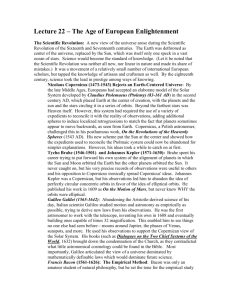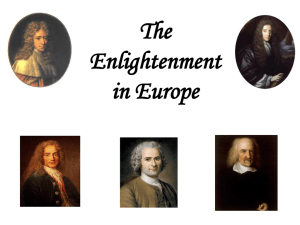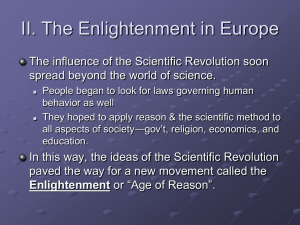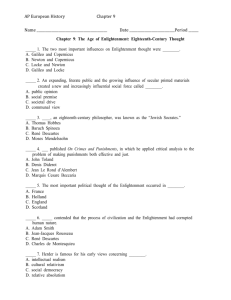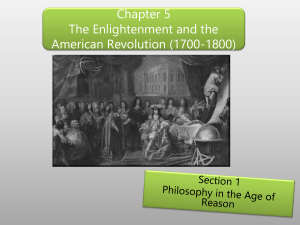Enlightenment PPT 1
advertisement
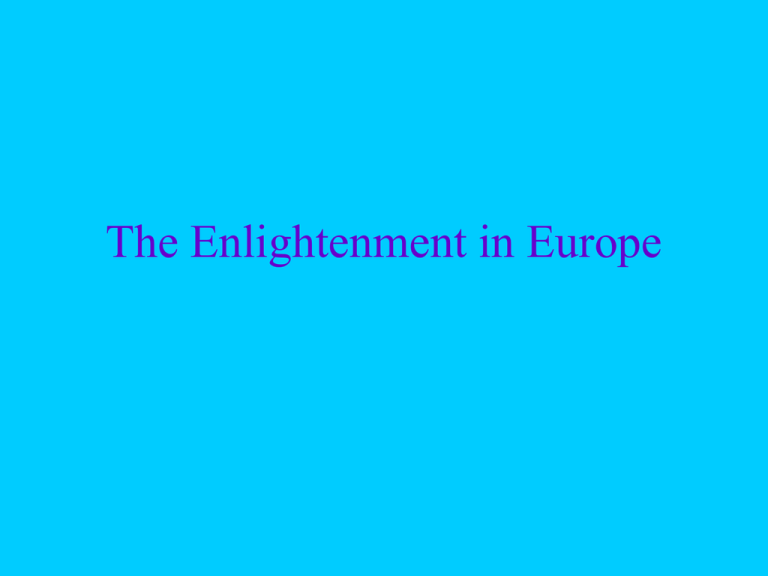
The Enlightenment in Europe The Enlightenment in Europe • The Scientific Revolution prompted new ways of thinking • Philosophers sought new insight into the underlying beliefs regarding government, religion, economics, and education The Enlightenment in Europe, cont. • Enlightenment- a new intellectual movement that stressed reason and thought and the power of individuals to solve problems • Also known as the Age of Reason Thomas Hobbes • English political thinker of the 1600s • Leviathan – Convinced that all humans were naturally wicked and selfish – Without governments to keep order, there would be “war…of every man against every man” Hobbes’ Social Contract • People would hand over their rights to a strong ruler, and in exchange, they would gain law and order • People act in their own self-interest, so a ruler needs total power to keep citizens under control • Ideal government: Absolute Monarchy John Locke • Believed people can learn from experience and improve themselves • Ideal Government: Self-government John Locke’s Natural Rights • All people are born free with three natural rights: Life, liberty, and property • Purpose of government is to protect these rights • If government fails to do so, citizens have the right to overthrow it • Government’s power comes from the consent of the people (foundation of modern democracy) The Philosophes • French word for philosophers • Paris became the meeting place for people to discuss politics and ideas (mid-1700s) • Philosophes believed that people could apply reason to all aspects of life 5 Core Beliefs of the Philosophes • 1) Reason- Enlightened thinkers believed truth could be discovered through reason or logical thinking • 2) Nature- The philosophes believed that what was natural was also good and reasonable 5 Core Beliefs of the Philosophes, cont. • 3) Happiness- The philosophes rejected the medieval notion that people should find joy in the hereafter and urged people to seek well-being on earth • 4) Progress- The philosophes stressed that society and humankind could improve • 5) Liberty- The philosophes called for the liberties that the English people had won in their Glorious Revolution and Bill of Rights Voltaire • Most brilliant and influential of the philosophes • Used satire against his opponents and often targeted the clergy, the aristocracy, and the government Voltaire, cont. • Always fought for tolerance, reason, freedom of religious belief, and freedom of speech • “I do not agree with a word you say but will defend to the death your right to say it” Montesquieu • Separation of powers – This would keep any individual or group from gaining total control of the government • Legislative- Makes the laws • Executive- Enforces the laws • Judicial- Interprets the laws • “Power should be a check to power” (checks and balances) • Became the basis for the U.S. Constitution Rousseau • Individual freedom • “Man is born free, and everywhere he is in chains” (civilization corrupts people) Rousseau, cont. • Direct democracy- government should be guided by the “general will” of society – People agree to give up some of their freedom in favor of the common good • Believed that all people were equal and that titles of nobility should be abolished Beccaria • Promoted criminal justice • Laws exist to preserve social order, not to abuse power • Fought against torturing of witnesses and suspects, irregular proceedings in trials, and cruel and unusual punishment Beccaria, cont. • • • • Right to a speedy trial Punishment should fit the crime Did not believe in capital punishment Governments should seek the greatest good for the greatest number of people Role of Women • Philosophes took a traditional view of women • Rousseau believed that a girl’s education should mainly teach her how to be a helpful wife and mother • Most males discouraged women from reading novels (encouraged idleness and wickedness) Role of Women, cont. • Women used Enlightenment ideas on government to challenge their roles in society – If everyone is born free, why are men and women still unequal? • Salons- social gatherings in which wealthy women helped spread Enlightenment ideas Mary Wollstonecraft • A Vindication of the Rights of Woman – Women, like men, need education to become virtuous and useful – Encouraged women to enter the maledominated fields of medicine and politics Legacy of the Enlightenment • Belief in Progress – – – – Science and technology Using reason to solve social problems Social equality (abolition of slavery) Democratic government Legacy of the Enlightenment, cont. • A More Secular Outlook – Scientists discovered that the mysteries of the universe could be explained mathematically – Changed the way people thought about God – Religious tolerance (Voltaire) Legacy of the Enlightenment, cont. • Importance of the Individual – Morals- people looked to themselves for guidance instead of the church or royalty – Government- formed by individuals to promote their welfare – Economics- people acting in their own selfinterest created economic progress

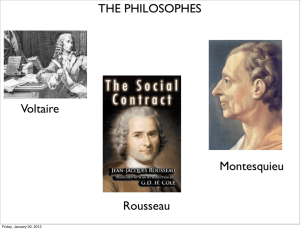

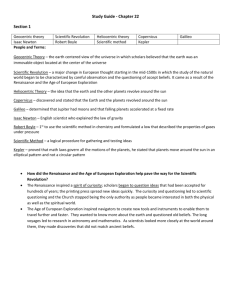
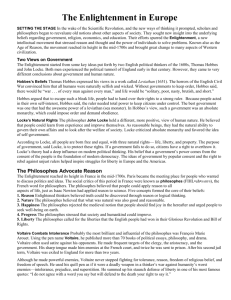
![6-2] The Enlightenment in Europe](http://s2.studylib.net/store/data/005802603_1-4aabf27e62711229ab33859d5b6ac4df-300x300.png)
